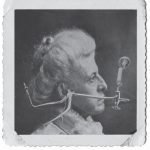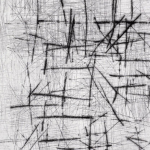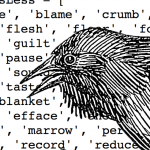critical ecologies
Room for So Much World: A Conversation with Shelley Jackson

Rettberg's and Jackson's interview, and their creative work's direct engagement with environments anticipate the themes in a forthcoming ebr gathering by Eric Rasmussen and Lisa Swanstrom, titled Natural Media. More than just an articulation of environmental 'issues,' the creative work of Jackson and Rettberg actively integrates snowfall in Brooklyn, tattooed skin on bodies, pollutants in Jersey City and New Orleans (post-2012), and other particles and particulars that are touched by natural and medial ecologies.
This conversation is published as the fourth in a series of texts centered around the publication of The Metainterface by Søren Pold and Christian Ulrik Andersen. Other essays in the series include: The Metainterface of the Clouds, Always Inside, Always Enfolded into The Metainterface: A Roundtable Discussion. and Voices from Troubled Shores: Toxi•City: a Climate Change Narrative.
Voices from Troubled Shores: Toxi•City: a Climate Change Narrative

This discussion is adapted from a presentation by Roderick Coover and Scott Rettberg of Toxi•City and other CRchange projects at the Arts Santa Mònica museum in Barcelona on March 3, 2016.Toxi•City was exhibited there as part of the “Paraules Pixelades” exhibition.
This conversation is published as the third in a series of texts centered around the publication of The Metainterface by Søren Pold and Christian Ulrik Andersen. Other essays in the series include: The Metainterface of the Clouds, Always Inside, Always Enfolded into The Metainterface: A Roundtable Discussion. and Room for So Much World: A Conversation with Shelley Jackson.
The Metainterface of the Clouds

The following assemblage, one of a series initiated with ebr version 7.0, is composed of four elements: a presentation (for release in October 2018) of Søren Bro Pold & Christian Ulrik Andersen’s The Metainterface including an excerpt from “The Cloud Interface: Experiences of a Metainterface World” chapter of the book (with permission from The MIT Press); a discussion (November 2018) by Scott Rettberg and Roderick Coover about the visual and narrative design of Toxi•City: a Climate Change Narrative, and a discussion of issues raised by The Metainterface (December 2018) that were taken up by the Bergen Electronic Literature Research Group during the EcoDH seminar, University of Bergen, June 14, 2018, and an interview with Shelley Jackson (January 2019) focused on her project Snow and her new novel, Riddance; or, The Sybil Joines Vocational School for Ghost Speakers & Hearing-Mouth Children. Contributors: Christian Ulrik Andersen, Roderick Coover, Shelley Jackson, Elisabeth Nesheim, Scott Rettberg, and Lisa Swanstrom.
This essay is published as the first in a series of texts centered around the publication of The Metainterface by Søren Pold and Christian Ulrik Andersen. Other essays in the series include: Always Inside, Always Enfolded into The Metainterface: A Roundtable Discussion., Voices from Troubled Shores: Toxi•City: a Climate Change Narrative and Room for So Much World: A Conversation with Shelley Jackson.
A Strange Metapaper on Computing Natural Language

Without anonymous peer review, there can be no formal recognition of literary scholarship, and ebr is no exception. That said, our journal looks for occasions to turn our confidential reports into public riPOSTes, if the reviewer is so inclined. In this essay, our colleagues from Coimbra, Manuel Portela and Ana Marques da Silva, stage reflections on the peer reviews that their own scholarly work has generated, in earlier submissions to other peer review outlets. The "metapaper" that results, is a further step in the initiative not to do away with peer review, but to bring the process into the public sphere.
Thirteen Ways of Looking at Electronic Literature, or, A Print Essai on Tone in Electronic Literature, 1.0

This essay has been reprinted from the journal CounterText (2.2) by permission of Edinburgh University Press.